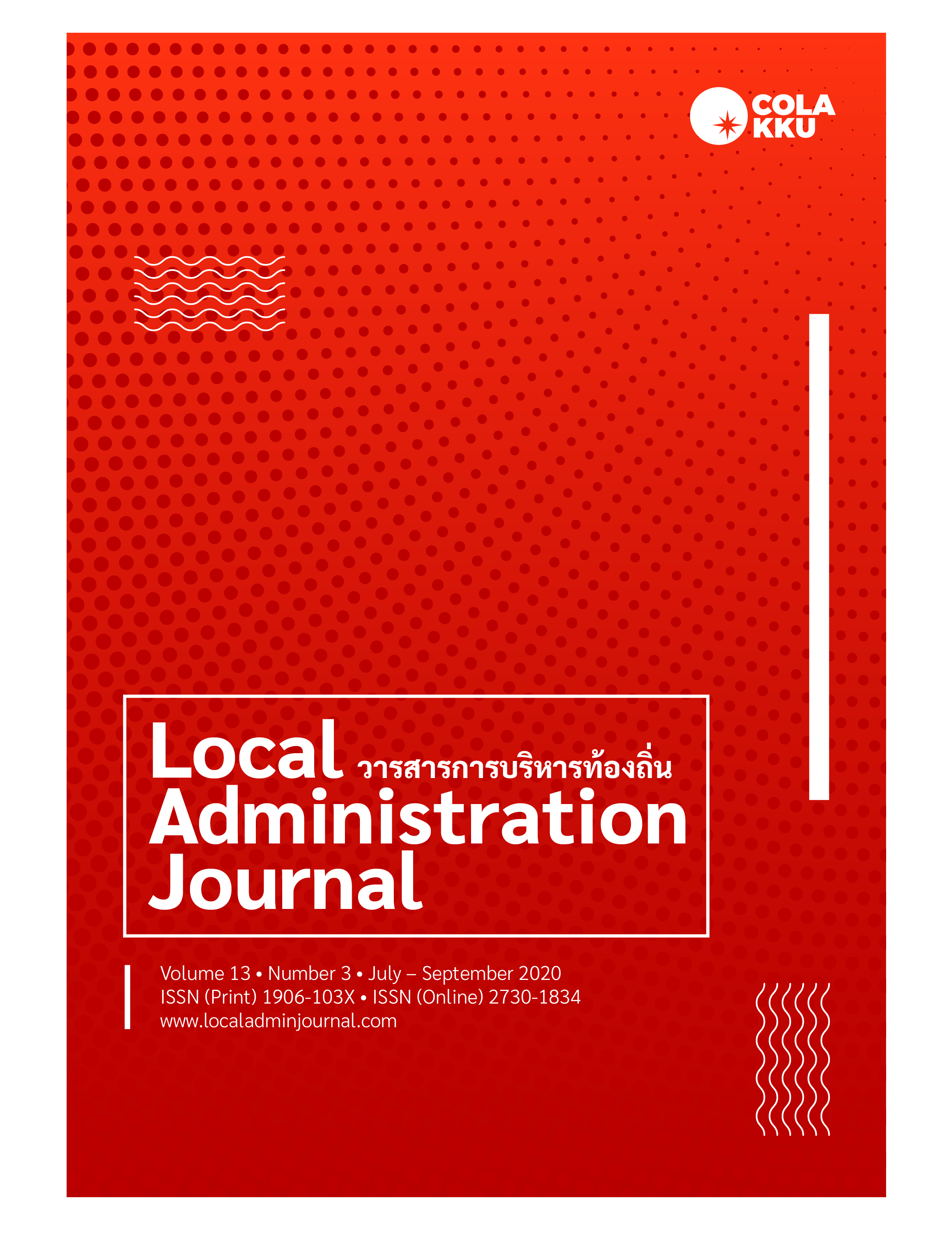ภาวะผู้นำและความสำเร็จขององค์กร
คำสำคัญ:
ภาวะผู้นำในเชิงการบริหารจัดการทรัพยากรมนุษย์สมัยใหม่บทคัดย่อ
บทความนี้มุ่งศึกษาแนวคิดเกี่ยวกับภาวะผู้นำที่ทำให้องค์การประสบความสำเร็จ เพื่อทราบตัวแบบภาวะผู้นำที่ทำให้องค์กรประสบความสำเร็จ ใช้วิธีการศึกษาผ่านการวิเคราะห์เอกสาร ผู้เขียนพบว่าองค์กรใด ๆ ไม่ว่าจะเป็นองค์การจากภาครัฐหรือภาคเอกชน แน่นอนว่าสิ่งที่คอยช่วยเหลือและผลักดันให้องค์การเหล่านั้นประสบความสำเร็จได้ ส่วนหนึ่งเป็นผลพวงมาจากการที่องค์การนั้นมีผู้นำที่ดีและมีคุณภาพในการบริหารงาน บริหารคน และบริหารการเปลี่ยนแปลง จนสามารถนำพาองค์การไปสู่ความสำเร็จดั่งที่มุ่งหวังไว้ได้ แต่การที่องค์การจะมีผู้นำที่มีภาวะผู้นำในเวลาที่ต้องการ และเป็นผู้นำที่มีประสิทธิภาพนำพาองค์การสู่การบรรลุผลลัพธ์ตามเป้าหมาย ท่ามกลางความซับซ้อนและความไม่แน่นอนกลับไม่ใช่เรื่อง่าย เพราะไม่มีผู้นำคนไหนที่รู้ทุกเรื่องในทันทีและเก่งทุกอย่างในทุกสถานการณ์ องค์การจึงมีความจำเป็นต้องพัฒนาและบ่มเพาะผู้นำ เพื่อหล่อหลอมความเป็นผู้นำให้ดีที่สุดและพร้อมที่สุด ซึ่งภาวะผู้นำเป็นเรื่องที่องค์การควรมีความเข้าใจในภาพรวม จะได้พัฒนาผู้นำได้ตรงตามความต้องการและตอบโจทย์องค์การ นอกจากนี้ องค์การยังมีความซับซ้อนมากขึ้นด้วย องค์การไม่ได้มีความเป็นอิสระที่จะดำเนินการเองโดยไม่ถูกกระทบกระเทือนจากปัจจัยที่อยู่ภายนอก ในทุกส่วนขององค์การจะต้องได้รับจากปัจจัยทางเศรษฐกิจ สังคม การเมือง และวัฒนธรรม ไม่มีระบบงานใดในองค์การที่จะเป็นอิสระโดยไม่พึ่งพาหรือไม่เกี่ยวข้องกับปัจจัยแวดล้อมภายนอก อีกทั้งความสำเร็จขององค์การยังต้องอาศัยผู้นำที่มีความรู้ความสามารถและมีประสิทธิภาพในเชิงการบริหารจัดการที่ดี
เอกสารอ้างอิง
ภาษาไทย
กรสรรค์ เอนกศักยพงศ์. (2556). กระบวนการบริหารทรัพยากรมนุษย์ที่มีผลต่อประสิทธิภาพการปฏิบัติงานของอุตสาหกรรมยานยนต์และชิ้นส่วน. วิทยานิพนธ์ปริญญาบริหารธุรกิจมหาบัณฑิต, มหาวิทยาลัยเทคโนโลยีราชมงคลธัญบุรี.
พัชรา วาณิชวศิน. (2562). การพัฒนาภาวะผู้นำ:จากทฤษฎีสู่แนวปฏิบัติที่ดีและกรณีศึกษา. กรุงเทพฯ: สำนักพิมพ์ปัญญาชน.
พันธุ์พรหม รังสิธารานนท์. (2558). การพัฒนาสมรรถนะพนักงานฝ่ายทรัพยากรมนุษย์ในบริษัทกลุ่มอุตสาหกรรมยานยนต์และชิ้นส่วน. ดุษฎีนิพนธ์ปริญญาปรัชญาดุษฎีบัณฑิต สาขาการพัฒนาทรัพยากรมนุษย์, มหาวิทยาลัยรามคำแหง
สุกัญญา รัศมีธรรมโชติ. (2548). แนวทางการพัฒนาศักยภาพมนุษย์ด้วย Competency. กรุงเทพฯ: ศิริวัฒนา อินเตอร์พริ้นท์ จำกัด (มหาชน)
สุธาสินี ภัทรวดี. (2552). หลักการของไคเซ็น. สืบค้นจาก http://www1.si.mahidol. ac.th/km/sites/default/files/u1/02_23_2306_asset5_26052560.pdf
สุภาพร เพียรดี. (2554). ความหมายของ QCC. สืบค้นจาก https://www.gotoknow.org/blog/kobaid
สุวรรณ สุทธิขจรกิจการ. (2548). Manufacturing KPI เพื่อมุ่งสู่ TPM. กรุงเทพฯ: ซีเอ็ด ยูเคชั่น จำกัด (มหาชน)
เสรี วงษ์มณฑา. (2542). การวิเคราะห์พฤติกรรมผู้บริโภค. กรุงเทพฯ: ไดมอนด์ อิน บิซิเนส เวิร์ล
ศิริลักษณ์ มานะวงศ์เจริญ. (2562). ยกระดับภาวะผู้นำ. กรุงเทพฯ: สำนักพิมพ์เนชั่นบุ๊คส์.
อรุณ รักธรรม และปีเตอร์ รักธรรม. (2560). พฤติกรรมการบริหารองค์การ. กรุงเทพฯ : โรงพิมพ์มหาวิทยาลัยธรรมศาสตร์
อาภรณ์ ภู่วิทยพันธุ์. (2547). Competency Dictionary. กรุงเทพฯ: บริษัท เอช อาร์ เซ็นเตอร์ จำกัด
Fiedler. F.E. (1967). The Contingency Modeling of Leadership. Seattle, WA: University of Washington
Kaplan R. S. & Norton, D.P. (1996). The Balanced Scorecard. Translating Strategy into Action. Boston: Harvard Business School Press.
Translated Thai References
Aneksakkayapong, K. (2013). Human Resource Management Affecting Work Efficiency of the Automotive and Auto Parts Industry. Master degree thesis of Business Administration. Rajamangala University of Technology Thanyaburi.
Manawongchajoen S. (2019). Leader shift. Bangkok: Nation International Edutainment Public Company Limited.
Patarawadee, S. (2009). Principle of Kaizen. Retrieved from http://www1.si.mahidol.ac.th/ km/sites/default/files/u1/02_23_2306_asset5_26052560.pdf
Pendee, S. (2011). The meaning of QCC. Retrieved from https://www.gotoknow.org/blog/kobaid
Puvitayaphan, A. (2004). Competency Dictionary. Bangkok: HR Center Company Limited.
Raktham, A. & Raktham, P. (2017). Administrative Behavior. Bangkok: Thammasart University Publishing House.
Rasameethammachote, S. (2005). Competency Based Learning. Bangkok: Siriwattana Interprint Public Company Limited.
Rungsiththaranon, P. (2015). The Development of the Competencies of Human Resource Development Personnel in Companies in the Automobile and Parts Industry. Doctoral Thesis of Philosophy in Human Resource Development. Ramkhamhaeng University.
Sutikajornkitkarn, S. (2005). Manufacturing KPI for TPM. Bangkok: Se-Education Public Company Limited.
Vanichvasin P. (2019). Leadership Development: Theories, Best Practices and Case Study. Bangkok: Panyachon Distributor Company Limited.
Wongmontha S. (1999). Analysis of Consumer Behavior. Bangkok: Diamond in Business World.
ดาวน์โหลด
เผยแพร่แล้ว
รูปแบบการอ้างอิง
ฉบับ
ประเภทบทความ
สัญญาอนุญาต
บทความทุกเรื่องที่ได้รับการตีพิมพ์ทั้งรูปเล่มและบทความออนไลน์ เป็นลิขสิทธิ์ของวิทยาลัยการปกครองท้องถิ่น มหาวิทยาลัยขอนแก่น



